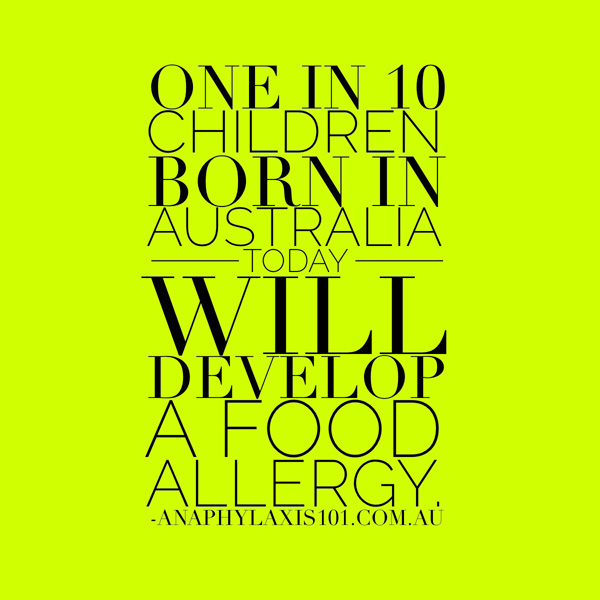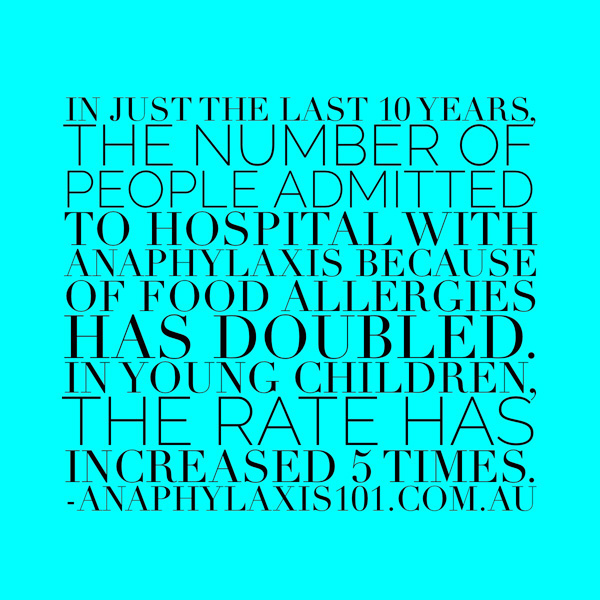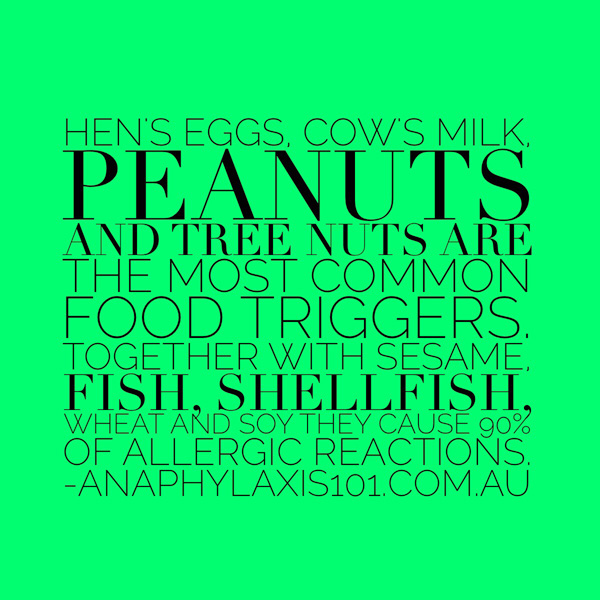Don’t We All Share Responsibility For Keeping Our Kids Safe?
This is an Alphapharm sponsored post.
Recently AJ and I were visiting a quiet, local playground with friends. Before too long another mum with two small children arrived. One of the children was eating a sandwich as he walked along; he started playing on the playground equipment, still carrying his sandwich. Our three girls and one other child were sitting together laughing and playing on a large communal swing that my friend and I took turns swinging as we chatted. As the boy walked towards us, I could see my friend look a little anxiously at the sandwich that he held. You see, my friend’s little girl, one of AJ’s dearest playmates, has multiple, extremely severe food allergies. At just two years of age this gorgeous girl has suffered so much already as a result of her allergies – rampant eczema all over her body, rashes, stomach pain, and even at times, swelling of the face and lips. Can you even imagine being not yet two, not yet able to communicate clearly, and feeling your throat closing up? I can’t. Can you imagine being the parent of that small child, always frightened that somehow despite your best efforts to keep them safe that your child’s life could be so easily placed at risk because they are inadvertently exposed to an allergen? I can’t.
Everyday families across the world are facing this very issue. I can’t claim to understand the science behind it but it is clear that the number of food related allergies and severe anaphylactic reactions is on the rise, and having seen just a little of what this one family go through on a daily basis to keep their child safe I get a little upset when I see comments such as, “Why should my child miss out/change their life/be told what to do… because of your child’s problem?”
You know what I say, “There but for the grace of God, go I.”
I don’t know that there are any perfect answers to this problem. But I do know that I would feel awful if something terrible happened to a child because of something I (or one of my children) did, after all don’t we all share responsibility for keeping our children safe? If you saw a child lost in a crowded fair wouldn’t you ask them if they needed help? If you saw a child struggling in the water at the local pool, you would reach out and lend a hand, right? If you saw a toddler running towards a busy road would you not assist? If you knew a child could die because of a peanut butter sandwich, would you not tell your child to have honey or ham instead?
I would like to think I’m preaching to the converted here but I don’t think it hurts any of us to hear a reminder – severe allergic reactions can kill. And young children (and their families) who are still learning to live with and manage allergies are vulnerable to this risk.
There are things we can all do to help. Here are five of them…
5 Things We Can All Do To Keep Kids With Allergies Safe
1. Take allergies and any notification from childcare, preschool or school about food restrictions seriously. When you don’t have personal experience with food allergies, these restrictions or the elimination of certain foods can be difficult to understand. Just know that they have been put in place to protect children, children who don’t have a choice – other than wanting to live that is.
2. Help our own children learn to be sensitive to the needs and feelings of others. It’s an important lesson. Help your own children learn to be empathetic by being empathetic and considerate yourself, as your attitude, interactions and friendships are what your children see, mimic and learn from – even more so then your words. Think about what you say and do with regards to your attitude to food allergies, school restrictions and children who suffer. After all, if your child was the one to inadvertently trigger an anaphylactic reaction in a child with an allergy, they would likely feel awful about the experience. The rules are there to protect both children, and children can learn to be compassionate, empathetic and humble as a result of these rules and restrictions.
3. Anaphylactic reactions can result from eating food to which the individual is allergic so always check in before offering food to other children. With young children, ask a parent or primary caregiver if it’s okay. Older children with allergies will generally be very well versed in asking for more information about the food or politely declining.
4. If you are planning a playdate or party that includes children with allergies, ask their parents for tips and/or help in preparing and serving safe foods. These parents will generally be more than happy to help with information or even supplying alternative choices for their child, as just like any parent they are just happy to see their child being included in fun and important social occasions. In all likelihood the child and family dealing with severe food allergies is already feeling a degree of social fear or even isolation – I can’t even imagine how I would deal with managing the risk my child faces every time he or she even leaves the house.
5. When visiting a playground, play centre or other public venue, ask your child to sit down while eating to reduce the likelihood that they will put other children at risk. It’s obviously a good idea for other reasons too!
Finally, raise your hand and get your local school involved in the Raise Your Hand for Anaphylaxis Awareness initiative. A national program aimed at helping Australian school communities to raise awareness of severe or life-threatening allergic reactions, the competition encourages people to virtually “raise their hand” for the chance for their school to win one of two educational grants – one for $10,000 and one for $5,000. The grants are provided specifically to help support ongoing communication and education about life-threatening allergies, and assist in the implementation of educational programs in schools. Individuals can simply raise their hand for their school by visiting the website and selecting the ‘Raise My Hand’ button. The total number of hands raised will determine the winning schools.
As for the sandwich in the playground, it was indeed peanut butter, one of our little friend’s most severe allergens. Fortunately, when my friend asked the little boy’s mother if her child could possibly sit out and stay off the play equipment while he finished eating, she agreed.
Do you have a family member with food allergies?





A child in my daughter’s pre-primary class has an anaphylactic allergy to watermelon.
Wow, that is fascinating, Sally.
What a wonderful post. My son is allergic to peanuts and I get sick when I hear the phrase you quoted : “Why should my child miss out/change their life/be told what to do… because of your child’s problem?” Thank you for this important post — it should be read by all parents!!
I completely agree, Amy. I think there is a general lack of understanding about how life threatening a child’s reaction can actually be. Hopefully we can help to raise awareness through this sort of campaign.
As a mum of kids with allergies, the more information we can share the easier it will be for my kids to negotiate the world safely. I know it sucks if peanut butter sandwiches is the only food your kids will eat, but it also sucks to not be safe at school.
I completely agree, Kate, thank you for sharing.
Wonderful post – and so important to keep having this discussion. Thanks for sharing.
It is such an important discussion, Chelsea, thank you so much for popping by.
Gee, I know all too well that anxious feeling your friend was experiencing with you at the park. I think I feel that on a daily basis. My two year old is anaphylactic to egg and everyday is a worry. The cupcakes, biscuits an slices that parents hand to their kids to run around with is what I fear most and as she approaches kinder and starts attending birthday parties I know things will get even harder. Thank you for sharing the great tips in this post and spreading the work about the ‘Raise your Hand’ initiative.
It’s such a hard path to travel, Kate, and I am just so happy to be able to help raise awareness in some small way. Eggs are in my friend’s little girls list of allergens too – in fact, her list is so long it’s hard to even fathom 🙁 I hope you are blessed with a supportive school and friendship group who will do everything the can to keep your little one safe.
We don’t have any food allergies thankfully. I can’t imagine how scary it must be 🙁
Our 2yo has severe allergies to dairy, soy, eggs, peanuts, treenuts. We had our first anaphylactic reaction, to milk powder in a satchet of fruit, at 5 months old. It is absolutely terrifying every single day, to know that a run in with one of her allergies could be life threatening. I’m the mum at the playground/shopping centre/park, wiping down rides, slides, swings, trolleys, etc before Miss 2 touches them, to try and remove any traces of allergen. I scan the hands and faces of every child who goes near Miss 2, looking for anything that could possibly hurt her. To read that parents of non allergy kids ‘get it’ is so encouraging, as so so so many people either don’t care, put it in the too hard basket or don’t want to know about it. Thanks for the article. From an “Allergy Mum”
Oh Melissa, my heart goes out to you and your family. I hope you are blessed with a supportive family and community who do whatever they can to keep your little one safe x
My 3 year old was diagnosed with severe food allergies at 15 months (eggs, dairy, peanut, wheat, corn, soy, sesame). I know the fear your friend felt. I’ve felt it many times. A seemingly innocent sandwich can send my child to the ER. Thank you for keeping the discussion going. It’s so important for adults and kids alike to be aware.
A friend of mine has a young son with severe food allergies. Her reaction to the worry of others not knowing how serious it is was to write a series of children’s books to educate the children, schools and other parents.
Everyone should have a look at her website
http://www.myfoodallergyfriends.com
Excellent post Christie with wonderful tips. It’s true, we need to all be mindful so that we can keep kids safe.
So important.
This is such an important issue and the more we can spread the word the better. A friend of mine’s daughter has a long list of food allergies. Before any birthday parties, she will call the Mum hosting the party to find out what is being served. She then makes her own allergy-free versions to take along to the party so that her daughter doesn’t feel like she’s missing out. That’s love right there.
I agree that it’s all of our responsibility. Those that have children that can eat anything without worry are fortunate but I’m sure if their child suffered from any of these allergies at all, they would want everyone else to be mindful of that as well. It’s not hard to put those tips of yours into place and when it comes to the safety and wellbeing of children, it’s something of great importance.
It’ s very scary what can happen and I think that most people don’t realise just how allergic some children can be. A few years ago at my kids’ daycare centre we were asked not to even give our kids peanut butter for breakfast just to keep it off their breath, which seemed extreme to me at the time but I obliged anyway despite the toddler tantrums. However, I recently read an article in the paper about a child who suffered an anaphylactic reaction on a plane because somebody in another aisle at the other end of the plane had opened a packet of peanuts and eaten them. Small nut particles had circulated through the air conditioning system and she had breathed them in. Thankfully she was OK, but such a reminder for everybody to be careful!